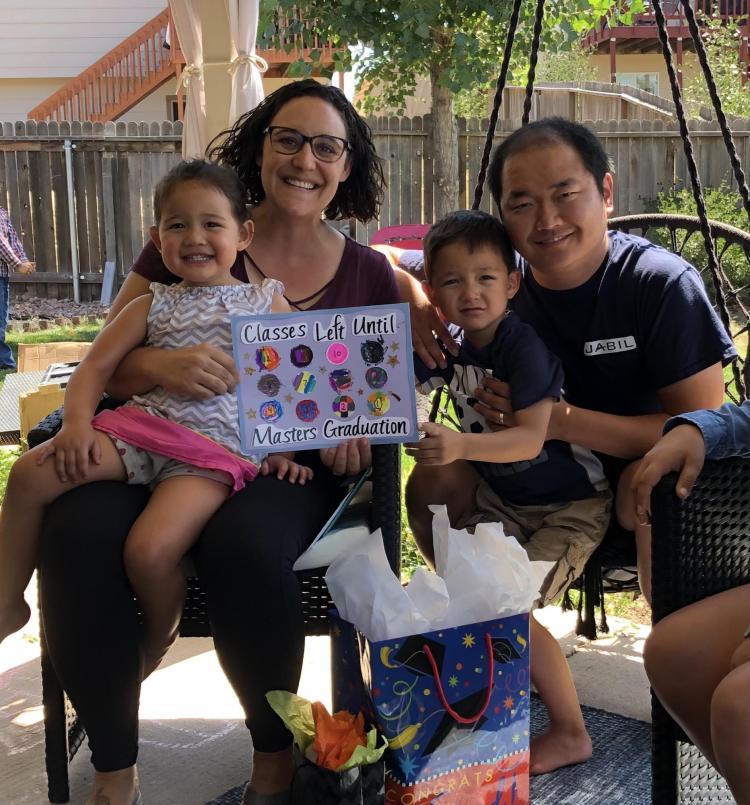First CU Boulder Teacher Leadership graduate gains a master’s degree and network of colleagues far and wide
Colorado Springs science teacher Kristen Sim first enrolled in a CU Boulder graduate certificate in Teacher Leadership in fall 2020 thinking: “No big deal, I’ll take one certificate and maybe get my master’s over a couple years.”
Fast forward one year, one pandemic, six self-paced online courses, three capstones, and immersion in an ever-expanding network of teacher leaders from all corners of Colorado, and Sim is now the first graduate of the new online Master’s in Teacher Leadership program at CU Boulder.
Launched in 2020, the growing Teacher Leadership program is designed to help teachers make a difference in their districts and communities through reflective practices and skills that teacher leaders can use to make change in their communities. The program’s innovative “stackable” graduate certificates mean teachers can enroll in a single course, certificate or continue toward a master’s degree once they complete any three of seven certificate offerings.

I feel empowered, and I am a leader. Leadership is not the principal at the school, and it's not the board members. Leadership is taking the initiative to do what's right, starting in your own classroom and then expanding that out to your school community."
Sim enjoyed her first certificate program, “Leading for Change in Science Assessment Practice,” so much that she decided to keep going. The COVID-19 pandemic was keeping her family and community in one place, so she decided to “buckle down” and work toward the master’s degree while her partner, who she commends, took on more responsibilities with their two young children.
Sim, who comes from a multi-cultural family, found the different courses to be interconnected and immediately applicable to her work and life.
“At first it seemed like the courses were very separate, like how is ‘science assessment’ going to fit with ‘compassion’? But they all intertwine,” she said. “It's all about diversity and bringing in all of these different cultures and pieces together and seeing that it is all connected.”
While the average self-paced course is designed to be completed within six months, Sim was able to fast track her coursework because of her dedication and ability to balance teaching with the convenience of the asynchronous core coursework. Each certificate is ideally accomplished over the course of an academic year and can be completed while an educator is actively teaching, and Sim completed three certificates at once over her pandemic year at home.
“The asynchronous part is a fabulous thing for teachers with our lives and schedules,” she said. “It's so unique and refreshing from any other program that I've ever looked at. It's not just turning in a portfolio of lessons; it's enabling me to enact workable plans to improve my school.
“It’s changed my outlook on life, and it's helping me be a better teacher.”
To close out each certificate, students enroll in real-time, online capstone courses with other teachers over the summer. Together, the teacher leaders, who hail from rural and urban regions of Colorado and beyond, work on problems of practice that they have identified within their classrooms, schools, or communities. Then teachers share experiences and expertise as they work collaboratively toward solutions as leaders together.
Sim loved her self-paced courses, but she found her real-time, capstone conversations to be where the magic of the program came together.
“When I got to the capstone, it was like, ‘Oh, I needed this,’” she said. “I needed to make connections with other teachers. We needed a soundboard and to see that we weren't alone. We're all fighting different battles within our schools, but we're all trying to make it better.
“We've built a network of other professionals who are at the same level and have the same goals and drive.”
With a network of new colleagues in her corner, a CU Boulder master’s degree, and leadership experiences in her classroom and school now flourishing, Sim says her views on educational leadership have shifted.
“I feel empowered, and I am a leader,” she said. “Leadership is not the principal at the school, and it's not the board members. Leadership is taking the initiative to do what's right, starting in your own classroom and then expanding that out to your school community.”

